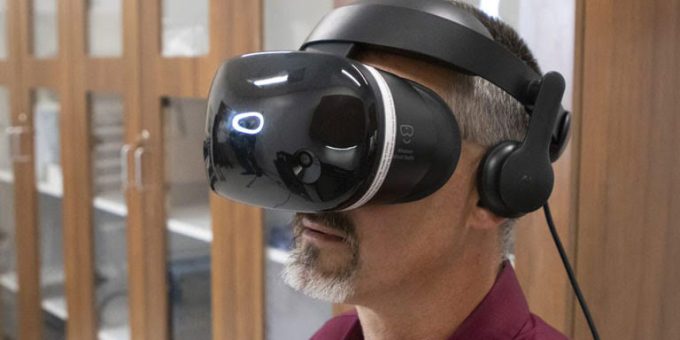
BLOOMINGTON – Indiana University researchers are combining psychological principles with innovative virtual reality technology to create a new immersive therapy for people with substance use disorders. They’ve recently received over $4.9 million from the National Institutes of Health funding and launched an IU-affiliated startup company to test and further develop the technology.
Led by Brandon Oberlin, an assistant professor of psychiatry at the IU School of Medicine, IU researchers have built a virtual environment using “future-self avatars” to help people recover from substance use disorders. These avatars are life-sized, fully animated, and nearly photo-realistic. People can converse with their avatars, who speak in the same voice using personal details in alternate futures.
“VR technology is clinically effective and increasingly common for treating a variety of mental health conditions, such as phobias, post-traumatic stress disorder, and postoperative pain, but has yet to find wide use in substance use disorders intervention or recovery,” Oberlin said. “Capitalizing on VR’s ability to deliver an immersive experience showing otherwise-impossible scenarios, we created a way for people to interact with different versions of their future selves in the context of substance use and recovery.”
After four years of development and testing in collaboration with Indianapolis-based treatment centers, Oberlin and his colleagues’ pilot study was published on Sept. 15 in Discover Mental Health. Their findings suggest that virtual reality simulation of imagined realities can aid substance use disorder recovery by lowering the risk of relapse rates and increasing participants’ future self-connectedness.
“This experience enables people in recovery to have a personalized virtual experience, in alternate futures resulting from the choices they made,” Oberlin said. “We believe this could be a revolutionary intervention for early substance use disorders recovery, with perhaps even further-reaching mental health applications.”
The technology is particularly well-suited for people in early recovery – a crucial time as there is a high risk for relapse—because the immersive experiences can help them choose long-term rewards over immediate gratification by deepening connections to their future selves, he said.
In the past five months, Oberlin’s team was awarded more than $4.9 million from the National Institute of Drug Abuse (NIDA) and the National Institute of Alcohol Abuse and Alcoholism (NIAAA), federal scientific research institutes under the National Institutes of Health (NIH), including a $319,542 Small Business Technology Transfer Phase I research grant, to advance their work.
The grants will support clinical trials designed to test for efficacy on relapse prevention, brain activation, and other important elements related to substance use disorder treatment, Oberlin said. For example, one study will deliver virtual reality experiences remotely via wireless headsets for participants to use at home, as the remote delivery of mental health interventions addresses a pressing need for people unable or unwilling to engage in an in-person clinical setting.
“The ultimate goal of our work is to leverage state-of-the-art VR technology for providing therapeutic experiences to support early recovery—a very dangerous time period marked by a high risk for relapse,” Oberlin said. “Last year marked another grim annual record for drug overdose deaths in the United States, with over 100,000 estimated deaths. New innovations in treatment and recovery are desperately needed, and we are hoping that IU’s innovative research efforts will answer this call.”
With support from the IU Innovation and Commercialization Office, Oberlin filed for international patent protection on the technology earlier this year.
He also co-founded a new IU-affiliated startup called Relate XR, LLC, with Andrew Nelson, an IU alumnus and CEO of Indianapolis-based virtual reality startup Half Full Nelson, to advance the development of the technology and its commercial potential.
“Brandon’s technology is a unique approach to the treatment of mental health conditions like substance use disorders, that has been a long-term challenge to individual well-being and societal health,” said Simran Trana, associate vice president of the IU Innovation and Commercialization Office. “We look forward to working with his team to develop and deploy this technology through Relate XR by leveraging translational Small Business Innovation Research funds and raising additional investment.”
Additional authors on the pilot study include Nelson and Yitong Iris Shen, an IUPUI graduate student in Oberlin’s lab. The initial project was funded by the IU School of Medicine’s Department of Psychiatry and the Indiana Clinical and Translational Sciences Institute.
Information: News at IU



